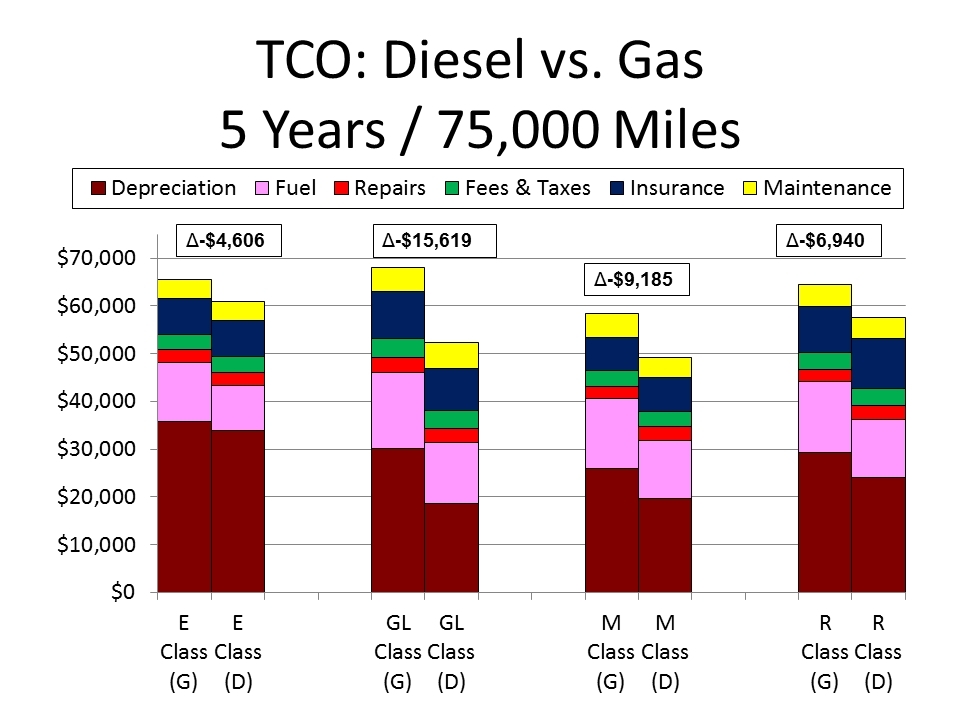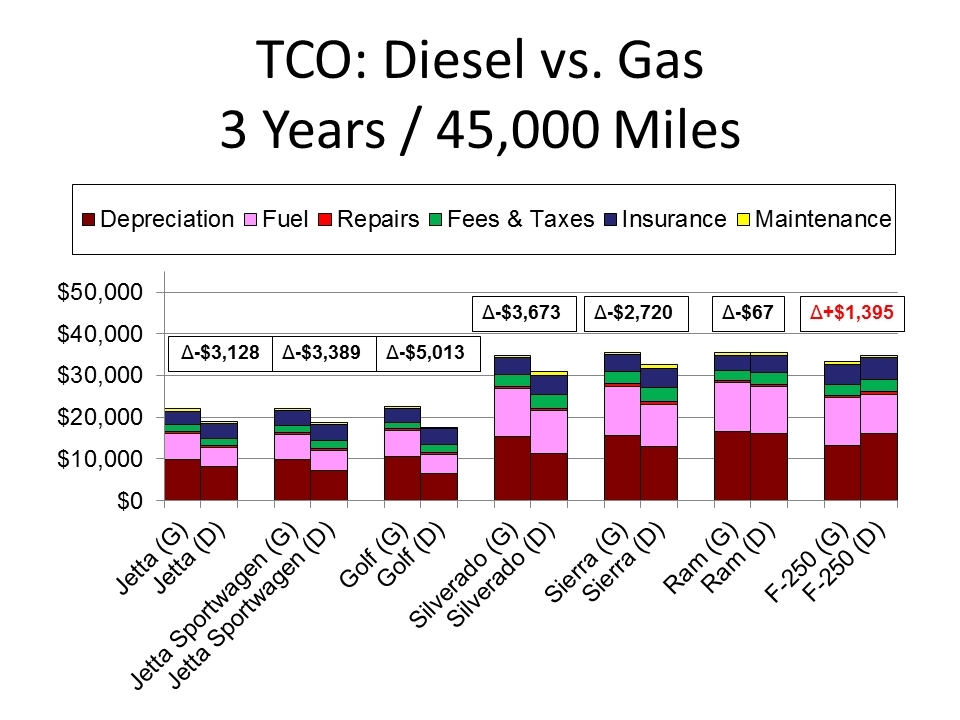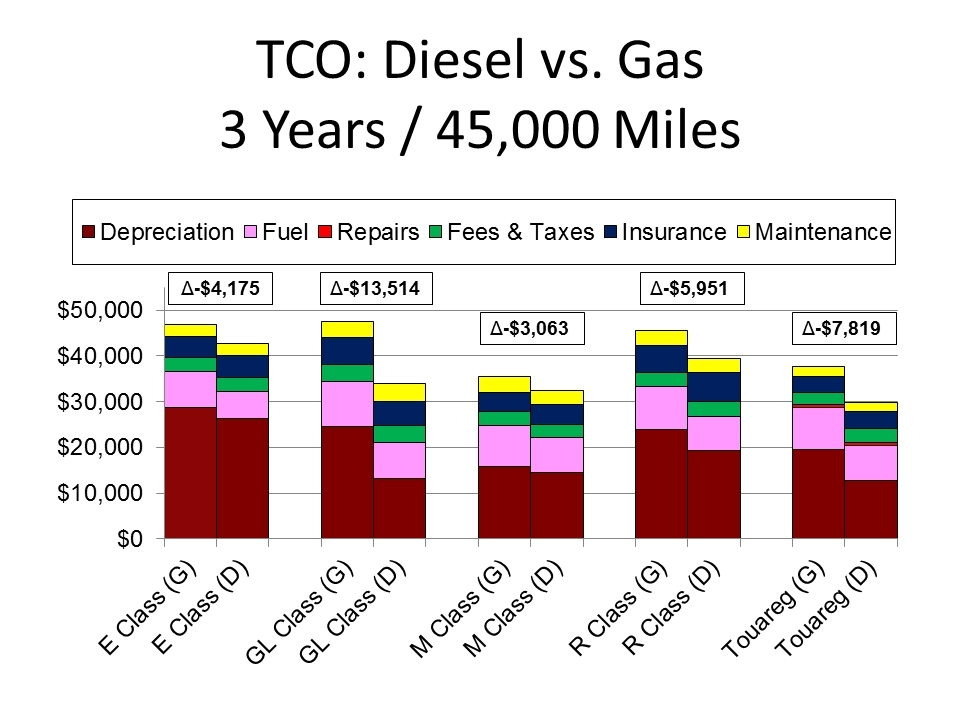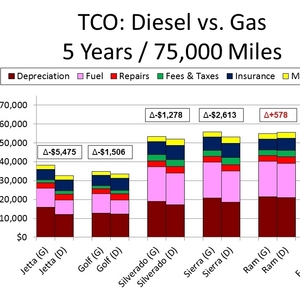Study shows diesels save owners money over gasoline versions





Source: UMTRI
July 19, 2013
BY Ron Kotrba
The University of Michigan’s Transportation Research Institute recently published a study that shows the total cost of ownership (TCO) is lower for diesel vehicles compared to their gasoline-powered counterparts. The researchers built their model by developing three- and five-year cost estimates of depreciation by modeling used vehicle auction data and fuel costs by modeling government data. They combined those estimates with three- and five-year estimates for repairs, fees and taxes, insurance, and maintenance from an outside data source.
“Our results show that clean diesel vehicles generally provide a return on investment in both the three- and five-year timeframes, though there are differences in the amounts of return among mass market vehicles, medium duty trucks, and luxury vehicles,” authors Bruce M. Belzowski and Paul Green, assistant research scientists with UMTRI, state in their report. “The estimates of savings for three and five years of ownership vary from a low of $67 in three years to a high of $15,619 in five years, but most of the savings are in the $2,000 to $6,000 range, which also include the extra cost that is usually added to the diesel version of a vehicle.”
The researchers add that their conclusions support the idea that diesel vehicles can and do compete well in the heavily spark-ignited U.S. vehicle market. “In particular, the idea that one can get a return on one’s initial higher investment in a diesel vehicle within three years is a very positive sign, considering that new vehicle buyers tend to keep their new vehicles for an average of three to five years,” the report states. “Some continuing challenges for diesels in the U.S. include the potential increase in the cost of diesel fuel compared to gasoline, and the resulting need for diesels to proportionally improve their fuel economy to maintain a TCO advantage. This is particularly important because both gasoline and diesel powered vehicles must improve their fuel economy as required by [CAFE] regulations for 2016 and 2025.”
The report concludes by saying as more diesels are introduced into the U.S. market, the premium diesels carry may decrease through the sheer number of competing models. “But the increased number of diesel models in the fleet may also bring down the price of diesel-powered vehicles, providing consumers with both price and fuel savings,” the report notes. “Diesel-powered vehicles are providing significant value to their owners through their TCO advantage over their gas-powered counterparts, and they will play an increasingly important role for manufacturers and consumers as fuel economy regulations becoming increasingly strict.”
Advertisement
The study was conducted for the Robert Bosch Corp.
Advertisement
Related Stories
A small but increasing amount of biodiesel in the United States is consumed in the residential, commercial, and electric power sectors, according to new estimates now published in the U.S. EIA’s State Energy Data System.
IAG and Microsoft are extending their 2023 co-funded purchase agreement for SAF by five years. The SAF used under the agreement will be produced by Phillips 66’s Humberside refinery and LanzaJet’s facility in the U.S.
Neste and DB Schenker, a logistics service provider, have collaborated to work towards expanding DB Schenker’s adoption of Neste MY Renewable Diesel in Asia-Pacific. DB Schenker trialed the fuel from December 2024 to February 2025 in Singapore.
Effective April 1, Illinois’ biodiesel blend requirements have increased from B14 to B17. The increase was implemented via a bipartisan bill passed in 2022, according to the Iowa Soybean Association.
Airbus is taking a significant step toward scaling the adoption of sustainable aviation fuel (SAF) by testing a new “Book and Claim” approach. This initiative aims to boost both supply and demand for SAF worldwide.
Upcoming Events










